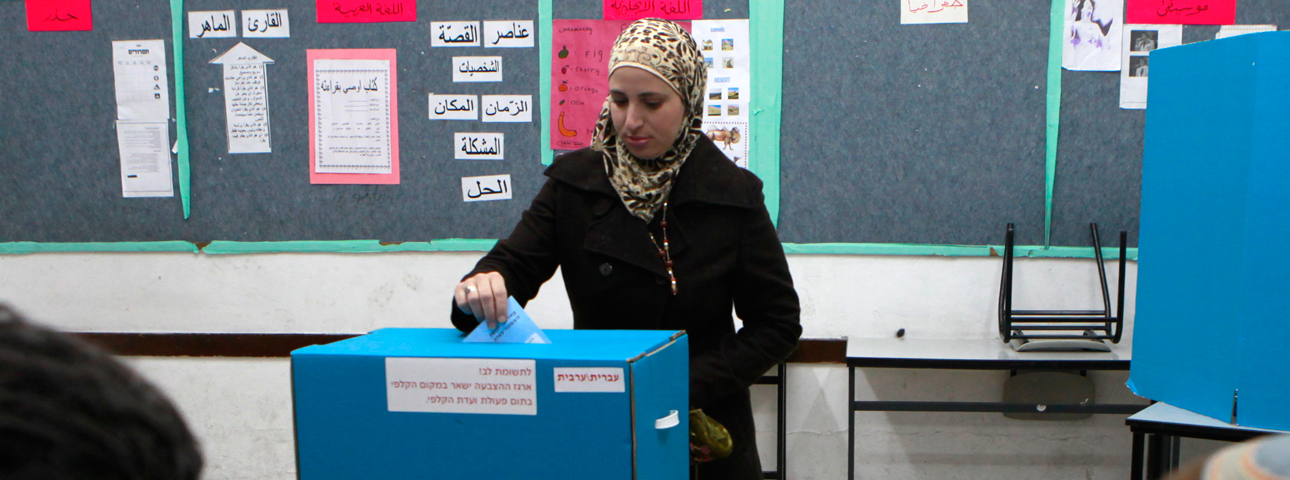And Now, Over to the Public
After abysmal Arab voter turnout, it’s time for public action. Arabs in Israel are desperate for a new discourse and leaders who connect with them -- what they don't want is more ideology

Flash 90
About two hours before the polls closed, discouraging reports were coming in from the various election campaign headquarters about low voter turnout among Israel’s Arab electorate, with estimates ranging between 20% and 30%. Arab parties made a tremendous last-minute effort, and succeeded in getting more Arab voters out to the polls, but this was a case of-- too little, too late. In the end, less than half of the eligible Arab voters took the trouble to get out and vote—49.1%, according to data from the Knesset Central Elections Committee. The Hadash-Ta’al faction won six seats, and the Ra’am-Balad faction managed to pass the electoral threshold and garner four seats. So in total, the four Arab parties lost three seats in comparison with their representation in the previous Knesset, in which the Joint List won 13 seats. The only party that can find comfort in having maintained its power is Hadash, which will once again be represented by four Knesset members. The other parties—Balad, the Islamic Movement’s United Arab List (Ra’am), and Ahmad Tibi’s Arab Movement for Change (Ta’al)—will each have to make do with just two representatives.
The Arab public is frustrated. It’s frustrated by its inability to have any real impact on the Knesset; it’s frustrated by the sense of continuing de-legitimization at the hands of the right-wing parties (and those in the center); it’s frustrated by the Nation State Law; but more than anything, it’s frustrated by the political conduct of its own representatives. Just 24 hours before the polls opened, some of the leading candidates from the Arab parties were still arguing over who was to blame for the dissolution of the Joint List.
Today, it’s clear to all that the vision of Arab unity as a result of the formation of the Joint List for the 2015 Knesset elections was nothing more than an illusion. It appears too that the rise in Arab voter turnout at those elections (63.5%) was not indicative of a new trend, but was simply the exception that proves the rule. Over the last two decades, the Arab public has gradually turned its back on parliamentary elections in Israel—from 75% voter turnout in 1999, down to this week’s all-time low.
On election day, I visited one of the largest Arab towns in Israel. My host, a veteran parliamentary aide with one of the Arab parties, took me around several polling stations. The activity around these stations was slow, quiet, and sober—a sharp contrast to the vibrant and energetic atmosphere seen in the very same town during the municipal elections just six months earlier. My companion carried a wad of voting slips for his party in his pocket, which he was supposed to distribute to voters. But there were no takers, and his pocket remained full. Why was voter turnout so low? There was no obvious answer, but the conclusion seemed unavoidable: the battle had already been lost, and there was little anyone could do. This time, the public had its say by choosing to say nothing at all.
So where do we go from here? Is the Knesset no longer relevant for the Arab public? Not necessarily. A survey conducted by the Konrad Adenauer Program and the Dayan Center at Tel Aviv University a few weeks before the elections found that almost 75% of the Arab public feels that the Knesset is certainly relevant to them and should not be given up on. Rather, the Arab public in Israel is desperate for a new discourse. It wants leaders who will speak to it directly and honestly, rather than viewing it as a “warehouse of votes” to be accessed whenever elections come around. And the Arab public does not attribute prime importance to ideological considerations. According to the 2018 Israeli Democracy Index, ideology is not among the three attributes that Arab citizens rate as most important in political figures: the ability to get things done; keeping one’s promises to voters; and lack of corruption.
The Arab parties will need to engage in some soul-searching and gear up differently for the next elections in four years’ time. But for now, the ball is in the public’s court. Will we see the formation of a new Arab-Jewish party? Or perhaps a version of Yesh Atid for the Arab sector? The resounding failure of the Arab parties in the 2019 elections may turn out to mark the beginning of a new era in Arab politics in Israel.
This article was first published in The Times of Israel.
